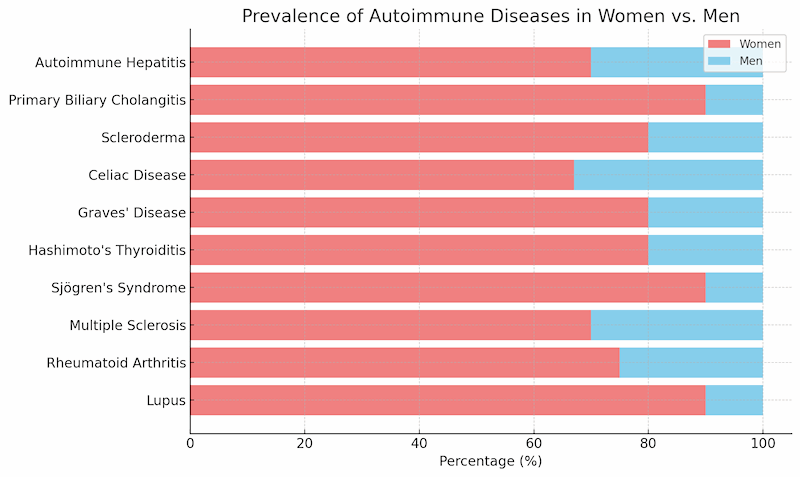- Improving lives since 2002
- Fast, Friendly Service
- Free Nutritional Counseling
The key to health is eliminating toxicities and deficiencies! - Dr. William R. Kellas


Women have specific health challenges and needs due to their unique biological makeup and their unique roles in life that give rise to immune system confusion and stronger immune reactions within their bodies that increase autoimmune disease risk. (See the graph below)

Even with all that science knows, we may not yet understand completely the reason behind the greater autoimmune problems of women, we nevertheless know for certain that women do have more autoimmune disorders than men. Consequently, women (and the men that love them) need to ensure that they take measures to avert autoimmune confusion in women’s bodies.
The immune system is a war machine designed to fight invading proteins that manage to get inside the human body. The immune system employes scouts that constantly scan the fluids of the body for these foreign or non-self proteins. Upon finding them, these scouts call for the immune system to attack. When the scouts are overloaded, their requests for help can start to be erroneous and attacks will be ordered against "self-tissue". That's the beginning of auto-immune disease. Therefore, keeping the body as cleansed as possible of foreign proteins is the best goal to have.
Vitamin D3 plays a supportive role in enhancing the liver’s ability to detoxify the body by improving liver health through the following mechanisms:
Also, keep in mind:
Bottom line: Vitamin D3 has been shown to have a very powerful benefit to the immune system. For most people, a minimum of 4,000 units of Vitamin D per day is needed to move low serum blood levels of Vitamin D3 to the optimum range of between 60 to 80.
For those who cannot get sufficient sunshine to bring their Vitamin D3 levels to optimum, probably, no other single supplement would be as important as Vitamin D3.
In regard to the important tactic of minimizing autoimmune confusion in a woman's body we believe that, right after insuring adequate Vitamin D3 levels, there is nothing more productive than to focus on internal cleanliness. The reason this is so important is that it minimizes the number of targets that the immune system needs to seek and destroy. When the immune system is targeting numerous foreign proteins, it is more likely to begin making mistakes. The fewer the foreign proteins in the body, the less likely it is that immune system confusion will result. Hence, keeping the internal body clean is paramount
Our main recommended tactics for cleansing the internal human body include:
For internal cleansing, we believe in the following helpful products (note that no product is suitable for everyone on earth because of individual uniqueness, but for many women these are great products for cleaning the internal body - always consult with a medical professional who knows your individual uniqueness):
<< Pop Up 1 - Enter Your Content Here >>
<< Pop Up 2 - Enter Your Content Here >>
Yes, there is a strong association between high sugar consumption during childhood and poor health outcomes in adulthood. Excessive sugar intake in childhood can have long-lasting negative effects on overall health, leading to various chronic conditions later in life. Here are some key points highlighting this association:
High sugar consumption during childhood, especially from sugary beverages and processed foods, significantly increases the risk of childhood obesity. Obesity often persists into adulthood, increasing the likelihood of developing conditions such as heart disease, diabetes, and joint problems.
Consistently consuming high amounts of sugar can lead to insulin resistance over time, increasing the risk of developing type 2 diabetes. This condition, once rare in children, is becoming increasingly common due to diets high in sugar.
Diets high in sugar are linked to increased levels of unhealthy cholesterol and triglycerides, which can lead to cardiovascular problems such as hypertension and heart disease in adulthood.
High sugar intake contributes to tooth decay and cavities in childhood. Poor oral health in early years often leads to long-term dental issues, which can have a broader impact on overall health.
Excess sugar consumption can disrupt metabolic function, leading to chronic conditions like metabolic syndrome, a cluster of risk factors for heart disease and stroke, as well as fatty liver disease.
Early exposure to high-sugar foods shapes taste preferences and eating behaviors. Children who consume a lot of sugar often carry these habits into adulthood, making it more difficult to maintain a balanced and nutritious diet.
In summary, excessive sugar consumption during childhood is strongly linked to poor health outcomes in adulthood, including obesity, diabetes, heart disease, and metabolic disorders. Reducing sugar intake in early years is crucial for promoting long-term health.
Yes, there is a strong association between high sugar consumption during childhood and poor health outcomes in adulthood. Excessive sugar intake in childhood can have long-lasting negative effects on overall health, leading to various chronic conditions later in life. Here are some key points highlighting this association:
High sugar consumption during childhood, especially from sugary beverages and processed foods, significantly increases the risk of childhood obesity. Obesity often persists into adulthood, increasing the likelihood of developing conditions such as heart disease, diabetes, and joint problems.
Consistently consuming high amounts of sugar can lead to insulin resistance over time, increasing the risk of developing type 2 diabetes. This condition, once rare in children, is becoming increasingly common due to diets high in sugar.
Diets high in sugar are linked to increased levels of unhealthy cholesterol and triglycerides, which can lead to cardiovascular problems such as hypertension and heart disease in adulthood.
High sugar intake contributes to tooth decay and cavities in childhood. Poor oral health in early years often leads to long-term dental issues, which can have a broader impact on overall health.
Excess sugar consumption can disrupt metabolic function, leading to chronic conditions like metabolic syndrome, a cluster of risk factors for heart disease and stroke, as well as fatty liver disease.
Early exposure to high-sugar foods shapes taste preferences and eating behaviors. Children who consume a lot of sugar often carry these habits into adulthood, making it more difficult to maintain a balanced and nutritious diet.
In summary, excessive sugar consumption during childhood is strongly linked to poor health outcomes in adulthood, including obesity, diabetes, heart disease, and metabolic disorders. Reducing sugar intake in early years is crucial for promoting long-term health.
Copyright 2002 - 2024. All rights reserved.
These statements have not been evaluated by the Food and Drug Administration. No product mentioned herein is intended to diagnose, treat, cure or prevent any disease. If you are pregnant, nursing, taking medication, or have a medical condition, consult your physician before making any lifestyle change, including trying a new product or food.
The information on this website is intended as a sharing of knowledge and information from the research and experience of the Healthy-Living.Org staff and contributors. It is not intended to replace a one-on-one relationship with a qualified health care professional and it is not intended as medical advice. You should not use the information on this site for diagnosis or treatment of any health problem or for modification of any medication regimen. You should consult with a healthcare professional before starting any diet, exercise or supplementation program, before starting or discontinuing any medication, or if you suspect you have a health problem. You should keep in mind that cited references to ongoing nutritional scientific study are most likely not accepted by the FDA as conclusive. These references and mentions of benefits experienced by others are disavowed as product claims and are only included for educational value and as starting points for your own research. No food or supplement can be considered safe for all individuals. What may benefit 999,999 of a million people may harm you. Therefore, no one can take responsibility for your health except you in concert with your trusted health professional.